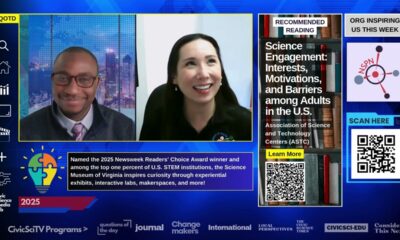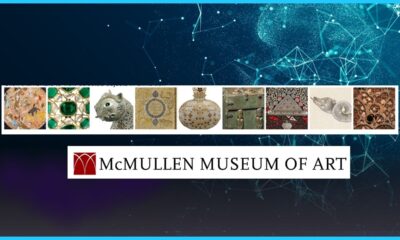Stories in Science Special Series
The Humbug Scientist
Camille McIntyre: No research, animal care, education, or science anything occupation seemed to want me. Internships didn’t want me, not even for free. Retail stores didn’t seem to want me either. My period of unemployment made me question everything about myself. Was I as intelligent or as skilled as everyone thought I was?

– Camille McIntyre, M.A. –
[su_boxbox title=”About” box_color=”#262733″]Camille is a budding scientist interested in research as well as science communication and media. She is also an artist and dreams of fusing her two passions together some day. She hopes to pursue a PhD. She is currently working at the Brooklyn Children’s Museum as an animal maintainer, providing care for the animals there and running educational programs for children. She can be reached via LinkedIn or on Twitter @jivechameleon.[/su_boxbox]
[su_boxnote note_color=”#bfc4af”]Story Key Points
- Everyone has doubts
- Do not let fear freeze you
- Appreciate the opportunities and options you have[/su_boxnote]
[dropcap]U[/dropcap]p in Vermont, in its own little green bubble, is a liberal-art school called Bennington College. I like to think of it as a magic-less Hogwarts. Every student graduates with strong opinions about the type of education they received and very vivid experiences. Yet, any descriptions tend to pale to reality and mystify others.
What I can and hope to make you understand is that Bennington, for me at least, was an

Camille McIntyre
institution that prided itself as a place for the proactive multi-tasker. We were encouraged to specialize not in one, but multiple things and to use those things to make a better world. I had a friend who majored in chemistry/ceramics and spent weekends blowing up clay with different concoctions. I had another friend who majored in cell biology/painting and used their sample slides as inspiration for their art pieces. Finally, there was me, who majored in animal behavior/biology/animation. I was a student split in two, but that made me and my fellow academics unique.
When I was about to graduate with my lab experiences and my artistic passions, I think a part of me thought I could do anything. I wasn’t worried about my year off and the possibility of getting a gig under a suffering job market. I worried mostly about completing my two senior projects – my science project and my educational science animation. I figured the time off would do me good because I could take a much-needed break and get a job in my field.
I should have known something was wrong then because I considered work the safe option over grad school. I remember feeling deeply afraid of wavering. There were a lot of options I could take in biology. I didn’t want spend years specializing in what I thought I wanted only to find that I was miserable and too old to go anywhere else. I don’t remember how, but I was already convinced that there was a time limit if I wanted a science career and I had to be careful.
So, when I graduated in June and I stayed jobless for months, I found myself depressed by my inability to move forward.
I met single parents, young mothers, recent GED students, red-eye shift workers, elderly seniors, and everything far and in-between. They all had one thing in common…
At those times, I would think about my parents who paid for my tuition. I would think about all the advisors that supported me at Bennington. I would then think hard about Ethel.
Dr. Ethel Tobach was a brilliant woman at the American Museum of Natural History. I worked with her for throughout my high school career and continued to help from time to time up to after my undergraduate years. She was the first person to teach me about ethology and comparative psychology. She was my entry point to real research and the first female scientist I really had contact with. She told me often that, as a woman in the still quite patriarchal profession, I need to toughen up and be fearless in what I wanted. She would scold when I didn’t look her in the eye or sat too quiet out of respect for the adults in the room.
She believed in me. Bennington seemed to believe in me. My family did too. Why else would they give their time?
However, knowing this only made things worse because I began to think I failed them. That I had wasted everyone’s time and my own. That was I like the great OZ, a humbug wizard that through luck alone fooled others that he had grand powers. That everything I accomplished was either a mistake or an accident. I tried to be careful, but I still managed to goof it up.
Yet, I loved animals. I loved science. I could not completely let it go of it.
Thus, when my mother suggested going back to school, I decided that it was a good idea. At that time, I remember thinking about going to grad school and getting a Masters or PhD. However, I still feared making the wrong decision and wasting other’s time as well as money.
I went to LaGuardia Community College and started my first (and only) semester in their Animal Technician Program in January of 2012. With certification, I hoped to finally find work with animals and be settled with that.
LaGuardia was a new and much needed experience for me. I met single parents, young mothers, recent GED students, red-eye shift workers, elderly seniors, and everything far and in-between. They all had one thing in common: they were determined to do better and to reach their dream designation. Most of these people had been through a lot and were going through a lot. But they carried on.
This made me determined to do my best as well. So, for a couple of months, I absorbed information and I threw it back up. I excelled in my course.
Yet, I was not happy.
For someone who was accustomed to discussion and asking questions, this way of learning was tedious and not challenging. I missed my friends from Bennington and the interactions I used to have there (I still miss it from time to time).
Yet, I had students around me that were sweating and clawing their way through the same material.
After far too long, I came to the awful realization that I was very, very entitled. My parents worked hard to make sure I got into the school I wanted. They supported me in everything I did, and I wanted for nothing. I had an imperfect, but high-quality education. I had all the tools that the students at LaGuardia wished they had and hoped to work towards.
I was supposedly “suffocating” myself not because I had to, but because I was spoiled enough to have a choice to. Unlike the students of LaGuardia who needed this place to step towards their future, I was using it to shelter my thin skin from the Boogie man. I was lucky enough that the only thing I needed to fear was fear itself. I left LaGuardia after one semester.
Soon after, I got a part-time job at Barnes and Nobles as a bookseller. It gave me enough money to pay for my first few semesters at Hunter College‘s Animal Behavior and Conservation MA Program in 2013. I graduated with my MA in 2016 and, after a rather chaotic round of PhD applications (that is a story in itself), ended up without a PhD program to my name.
It was hard to be denied entry and I would be lying if I did not feel like a humbug scientist again. However, from my experiences, I have learned that it will not last and that I need to be proactive. I cannot condone my elitist ideas, pride or whatever it was that kept me in fear. I cannot keep myself from achieving what I need to do just to maintain an illusion of grandeur.
Most importantly, I need to be patient and put work into getting exactly what I want; not what is safest to get.
I am now working at the Brooklyn Children’s Museum and supporting the next generation. I am developing a project that combines my love for science, art, and education. I am working on publishing my MA thesis which examined the effects of audio-visual multimodal integration on startle probability in goldfish.
The goal of the project was to investigate the underlying behavioral and physiological mechanisms behind the inverse effectiveness principle of multimodal integration popularized by Stein and Meredith. I am in talks about a PhD program, which looks promising if I can get the funding. I am doing things and, even if it’ll be a bit bumpy, I will get there. I have to keep myself level-headed and ready for anything that comes my way.
After all, even the humbug wizard eventually found his place under the rainbow.
Cover Image by Bruno-Marie on Pixabay
[su_boxbutton url=”https://storiesinscience.org/wp-content/uploads/2018/04/McIntyre-Camille-Stories-in-Science-DOI.pdf” target=”blank” style=”flat” background=”#545759″ icon=”icon: cloud-download”]Download the Story[/su_boxbutton]
Impact
Sessions
Total number of Sessions. A session is the period time a user is actively engaged with the page.
Visitors
Users that have had at least one session within the selected date range. Includes both new and returning users.
Page views
Pageviews is the total number of time the article was viewed. Repeated views are counted.
The CS Media Lab is a Boston-anchored civic science news collective with local, national and global coverage on TV, digital print, and radio through CivicSciTV, CivicSciTimes, and CivicSciRadio. Programs include Questions of the Day, Changemakers, QuickTake, Consider This Next, Stories in Science, Sai Resident Collective and more.

-
Audio Studio1 month ago
“Reading it opened up a whole new world.” Kim Steele on building her company ‘Documentaries Don’t Work’
-
 Civic Science Observer1 week ago
Civic Science Observer1 week ago‘Science policy’ Google searches spiked in 2025. What does that mean?
-
Civic Science Observer1 month ago
Our developing civic science photojournalism experiment: Photos from 2025
-
Civic Science Observer1 month ago
Together again: Day 1 of the 2025 ASTC conference in black and white
Contact
Menu
Designed with WordPress
























